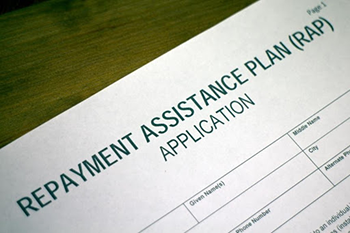
Do I Have to Pay Back My Long-Term Disability Benefits?

There are several reasons why you may be asked by your Long-Term Disability (LTD) company to pay them back benefits they already paid you. The request is usually as a result of an overpayment claimed by the insurer. The overpayment can be due to your recent receipt of deductible income from a source considered offsetable under your policy. The overpayment can also result from a miscalculation due a mistake by you or your disability insurance company.
Going through the process of applying for and being granted disability benefits can be a long journey. Delays and requests for additional documents are not uncommon. You may even be asked to be examined by an unfamiliar doctor, further lengthening the process. All of this can result in more frustration when your insurance company asks you for much of the money back.
If you have been contacted by your long-term disability carrier about an overpayment, you may be wondering if you have to repay that money. Let’s take a look at how disability carriers treat overpayments and what you can do to ensure that you are complying with the rules surrounding long-term disability benefits.
Overpayment due to an award of Social Security Disability Benefits (SSDI Benefits)
When it comes to retroactive SSDI awards, whether you have to repay anything to your LTD carrier will depend on your policy terms and any additional agreements you signed, including a “Reimbursement Agreement”.
If your policy was offered as part of a group benefits package from your employer, then your policy likely has a provision describing “other income benefits” or “deductible sources of income.” The section almost always includes Social Security Disability benefits. Such provisions not only include your primary social security disability benefits payable to you but also any dependent benefits payable for any eligible dependents—usually children under age 19.
If your LTD policy lists SSDI benefits as an offset and your disability is expected to last longer than 6 months, then your LTD carrier will require you to apply for SSDI benefits. Some policies will specifically state the insurance company is entitled to reimbursement for any overpayments resulting from the receipt any offsetable income. Depending on the insurance company, the policy may also include a provision stating the company can estimate your SSDI benefits and reduce your LTD benefits by that estimate even if you are not receiving SSDI benefits. They will, however, agree to pay you your regular monthly benefit in exchange for you signing a written agreement stating you will apply for SSDI benefits, appeal any denials and reimburse them for any overpayment that results from a retroactive award.
If you signed the reimbursement agreement, then you have a contractual duty to reimburse your LTD company for an overpayment covered by that agreement.
If you did not sign a reimbursement agreement but instead opted to have the insurance company estimate your SSDI benefits, then you will not be required to pay them back once you receive your SSDI benefits.
Even if you signed a reimbursement agreement, there may be other options available to avoid having the repay that money.
Overpayment due to VA Benefits

It is not uncommon for claimants to receive Veterans’ Disability Benefits (VA Benefits) while also receiving LTD benefits. Whether VA benefits will be considered an offset, again, depends on the particular policy language. Often, however, the answer is not as clearly defined as it is when the overpayment involves an SSDI award.
Some insurance carriers will include specific language in the policy providing that VA benefits are an offset, but only for benefits that are paid for the same disability. For example, if you have been receiving VA disability for PTSD for years, even while working, then you become disabled due to a physical disability and receive LTD benefits then your VA benefits may not be considered an offset.
Other carriers, will contain broad language such as “Other Income Benefits” includes benefits paid or payable under a “Compulsory Benefit Act or Law.” Courts have allowed insurance companies to offset VA benefits under such broad policy language.
It is important to remember, however, that VA benefits are not always considered an offset and its possible that only a fraction of the benefits may be considered an offset rather than 100%, so it is important to consult with a Long-Term Disability Attorney for help in this situation.
Overpayments due to Calculation Mistakes
It is not uncommon to see a carrier allege that a mistake has been made in calculating the regular monthly benefit. Mistakes can occur due to an omission of information by the claimant—such as in the case of receipt SSDI Dependent/family benefits. Often, claimant’s do not realize that SSDI benefits paid for their children, as long as it was paid as a result of the claimant’s disability are considered an offset. Also, the failure to apply for dependent benefits may not excuse you from having your benefits reduced by your LTD carrier as long as those benefits are “payable”—you may be required to apply for any additional benefits for which you may be eligible as a result of your disability. In these situations, there is normally no question that the carrier will want you to repay the money.
If the mistake resulted from an internal accounting error (this does happen) then many times the insurance company will waive the overpayment but will apply the correct amount going forward from the date the error is discovered. However, some carriers, such as Reliance Standard, have been known to include specific language in their policies stating they have the right to be reimbursed for an overpayment even if the miscalculation was entirely their fault!
How Do I Know If I Have to Pay Back an Overpayment?
In most cases, the claimant will have signed a reimbursement agreement and will be contacted by the insurance company shortly after the SSDI award has been issued. Your insurance company will find out about your award either through the process of performing a review and you disclose it on the claimant statement—a requirement on most claimant statements—or you used your insurance company’s recommended SSDI vendor to apply for SSDI benefits and that vendor notified your insurance company of your award.
Some carriers, such as New York Life, will offer you a buyout of your disability benefits and agree to waive the overpayment. New York Life will usually get you to agree to this before you receive a decision on your SSDI claim. This is risky for the claimant and an experienced long-term disability attorney should be consulted before any discussions with New York Life are made regarding an overpayment or settlement buyout offer.
How Is an Overpayment Paid Back?

Most of the time you will be required to pay the carrier a lump sum payment from your award of deductible income. Some claimants sign an agreement allowing the SSDI overpayment to be deducted from their bank account once the award is received—this is NOT recommended. Usually, this agreement is signed when working with the insurance company’s recommended SSDI vendor. You should never agree to allow the overpayment to be deducted directly from your bank account.
Your insurance company will provide you an accounting of the alleged overpayment and should give you a specific breakdown of the numbers. Typically, a credit will be given for any SSDI attorneys’ fees that were paid for handling the SSDI claim.
What Are My Options When There is an Overpayment?
Your options will depend on your policy language, whether you signed a reimbursement agreement, the amount of your monthly benefit vs the overpayment balance, the anticipated future benefits payable and various other factors. Sometimes, long-term disability carriers will present claimants with several options on how to resolve an overpayment. Some carriers may allow you to reduce your long-term disability payments while your SSDI claim is pending in order to avoid an overpayment once your application has been processed and approved. Unfortunately, this is simply not an option for many claimants as long-term disability payments are only a fraction of the amount that they have earned while employed.
You should hold on to any lump sum retroactive Social Security awards until you hear from your long-term disability carrier on the status of an overpayment. Initially, your long-term disability carrier may not be aware of your SSDI claim being approved. It may take weeks or even months before they alert you to their intention to recover the overpayment caused by the payout from Social Security. You may even be required to notify your carrier of the award.
What If I Don’t Have the Money to Pay Back an Overpayment?
In most cases, the carrier will freeze your LTD benefits and apply your net monthly payment toward the overpayment. As long as you continue to comply with the ongoing review and the carrier continues to find you disabled then your benefits will resume once the overpayment is completely recoupled.
An experienced disability settlement lawyer may be able to negotiate a lump sum buyout of your disability claim so you can forgo all future review by your insurance company. The payment, however, will always be much less than the total anticipated future benefits. This is option is often a more alluring option to those who have had their benefits frozen by their carrier.
For some, a buyout settlement is not only a way to take care of an overpayment but also a way to avoid having to deal with the ongoing reviews by the insurance company, which are usually more often and more invasive than the SSA reviews for the SSDI claim. Now that you have a steady stream of income benefits from another source—SSDI—a buyout could be a good option. This is not recommended for everyone and the option should be discussed with an experienced long term disability settlement attorney before approaching the insurance company.
Victor Peña Law Can Help
If you have been contacted by your long-term disability carrier about an overpayment, or you are worried about being overpaid because you have a pending SSDI application, Victor Peña Law can help. Attorney Peña specializes in handling long-term disability matters and resolving overpayments in a lump sum settlement. With years of experience to call upon, he can help you navigate this often complex process and make sure that you have someone fighting on your side against the powerful insurance companies. Reach out to us by calling (954) 475-6038 or by contacting us online.
Receive a copy of our Disability Buyout booklet by texting us through the text widget on your screen and asking for a copy.
